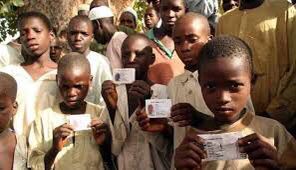By Ismail Amanatullah

In the northern part of Nigeria, it’s not uncommon to witness children as young as 13 years old queuing up at different polling units with voter cards claiming they’re 20 or above.
You might wonder why they’re there. The answer is quite simple. I’ve come across children who confessed that their political parents registered them to vote before they reached the legal voting age. Their reasoning? The elections were approaching, and their parents needed their votes. When I pointed out the illegality of this, they shrugged it off with a proud grin. It was normal for them, and they took pride in owning a voter’s card.
This phenomenon occurs for two reasons. Firstly, some politicians pay to have children vote to increase their chances of winning elections. Secondly, the desperation of politicians to win at any cost drives them to engage in underage voting. They often use children to create the illusion of a massive voter turnout and to manipulate the final vote tally.
The Sun News Online reported, “Underage voting occurs because of the desperation of politicians to win at all costs. Usually, the ruling party indulges in this act to garner phantom votes where there is voter apathy or where they have chased voters away with thugs or security agents. They use children to vote to give the impression that there is massive turnout and to justify whatever figures they will cook up as their scores.”
Nigeria operates a universal adult suffrage system, which means that a person must have reached “full age” to qualify to vote. The 1999 Constitution of the Federal Republic of Nigeria defines “full age” as eighteen years and above.
In February 2018, observers from organizations such as the Center for Information Technology and Development (CITAD) and Action Aid International Nigeria witnessed underage citizens voting during local government elections in Kano state.
A 2021 news report revealed that during the January 6, 2021, local government elections, children between the ages of 9 and 15 were seen voting in some Kano state voting centers.
In November 2022, the Independent National Electoral Commission (INEC) in Nigeria vowed that citizens who hadn’t reached the legal voting age of 18 would not be allowed to participate in the 2023 elections.
However, INEC failed to prevent underage voting during the February presidential elections. The International Federation of Women Lawyers (FIDA) stated in its election monitoring reports that its observers confirmed cases of underage girls voting in Saturday’s general elections in Kaduna and Kwara states. (source: business day.ng)
How much more of this should we endure? Children who are too young to make informed decisions, children whose place should be on playgrounds and in classrooms, are instead lining up to vote for candidates they know little to nothing about, except what they’ve been told. These children won’t face the consequences of their choices; it’s the adults who will bear the burden if things go wrong.
So why do children vote? What business do they have in the voting arena? Why aren’t adults, who will experience the consequences, allowed to vote?
Have we considered how this will impact these kids in the future, knowing they were pawns in an adult’s game, aware that they made an irreversible mistake, broke the law, and deprived adults of their right to choose what’s best for everyone?
Some argue for reducing the voting age to 16, but I contend that we should maintain the current age requirement. Politics isn’t child’s play; it requires intelligence and thinking outside the box. How can we make such important decisions without reaching maturity? If a child is already intelligent at 16, imagine how much more they can bring to the table at 18.
